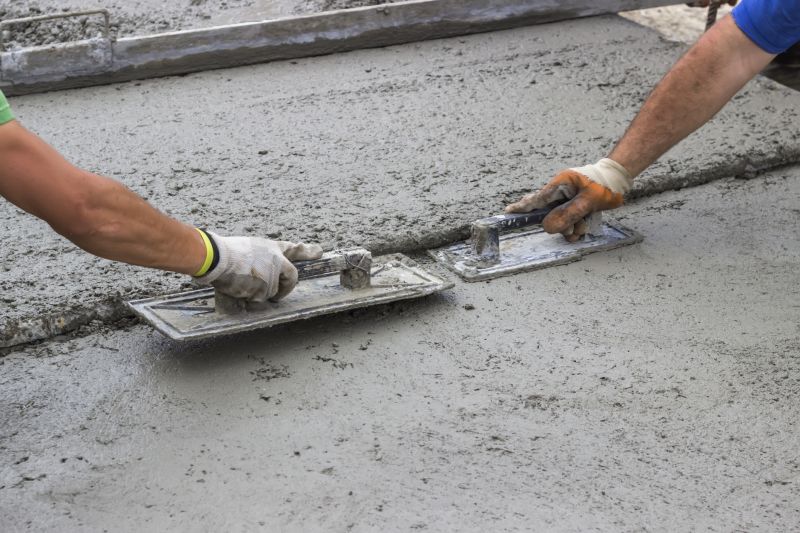Leading Concrete Repair Materials for Long-Lasting Surface Restoration
Compare top-performing products designed to withstand wear and tear, ensuring your concrete repairs stand the test of time.
 Concrete repairs are essential for maintaining the integrity and appearance of both residential and commercial structures. Over time, concrete surfaces can develop cracks, chips, or surface deterioration due to weather exposure, ground movement, or heavy use. Selecting the appropriate products for concrete repairs ensures that these issues are addressed effectively, extending the lifespan of the concrete and preserving its functionality.
Concrete repairs are essential for maintaining the integrity and appearance of both residential and commercial structures. Over time, concrete surfaces can develop cracks, chips, or surface deterioration due to weather exposure, ground movement, or heavy use. Selecting the appropriate products for concrete repairs ensures that these issues are addressed effectively, extending the lifespan of the concrete and preserving its functionality.
Top Overall Option
Polymer-Modified Concrete Patch
A versatile polymer-modified concrete patch offers excellent adhesion and flexibility, making it suitable for filling cracks, holes, and surface imperfections. Its ease of application and durable finish help ensure long-lasting repairs, especially in areas subject to movement or exposure to elements.
Types of Products For Concrete Repairs
Concrete Crack Fillers
Products designed specifically to fill narrow cracks and prevent further deterioration, available in caulking or liquid forms.
Concrete Patching Compounds
Ready-mix or premixed compounds used to repair larger surface damages like chips or spalls.
Hydraulic Cement
Specialized cement that expands as it sets, ideal for sealing leaks and repairing structural cracks.
Resurfacing Concrete
Thin overlays or skim coats that restore surface smoothness and appearance on worn or damaged concrete.
Waterproofing Sealers
Sealers that penetrate or coat the surface to prevent water ingress and reduce freeze-thaw damage.
Bonding Agents
Adhesives that enhance the bond between old and new concrete layers for seamless repairs.
Epoxy Injection Kits
High-strength epoxy resins used to fill deep cracks and restore structural integrity.
Polyurethane Foam
Flexible foam used for sealing larger cracks and joints, accommodating slight movements.
Surface Hardeners
Products applied to improve surface durability and reduce dusting on concrete floors.
Crack Repair Tubes
Pre-measured tubes for quick and easy crack sealing in small to medium-sized cracks.
Self-Leveling Overlays
Pourable products that create a smooth, level surface over uneven or damaged concrete.
Polymer Resurfacing Mortars
Advanced mortars that provide durable overlays for heavily worn surfaces.
Curing Compounds
Products that retain moisture during curing to improve strength and durability.
Surface Cleaners and Prep Solutions
Solutions used to prepare concrete surfaces before applying repair products.
Expansion Joint Filler
Materials used to fill and seal expansion joints, accommodating movement and preventing damage.
Fiber Reinforced Repair Mixes
Concrete mixes enhanced with fibers to improve toughness and crack resistance.
Polymer Modified Overlays
Overlay products that bond well with existing concrete, providing a durable finish.
Grout Mixes
Flowable mixes used for filling voids and leveling uneven surfaces.
Popular Choices
Widely used for sealing small cracks and preventing water intrusion.
Convenient options for quick surface repairs in various sizes.
Commonly selected for sealing active leaks and structural cracks.
Popular for restoring worn or uneven concrete surfaces.
Frequently chosen to protect concrete from moisture damage.
Favored for repairing structural cracks with high-strength bonding.
Effective for sealing larger cracks and joints with flexibility.
Used to improve durability of concrete floors in high-traffic areas.
Popular for small-scale crack sealing projects due to ease of use.
Chosen for creating smooth, even surfaces over damaged concrete.
Selected for their enhanced crack resistance in structural repairs.
Commonly used to maintain joint flexibility and prevent damage.
Popular for renewing and strengthening worn concrete surfaces.
Often used to ensure proper curing and strength development.
Frequently chosen to improve adhesion between old and new concrete.
When considering concrete repair products, it's important to understand the different types available. Some products are designed for filling cracks and holes, while others are formulated for resurfacing or reinforcing weakened areas. Proper preparation of the damaged surface often enhances the effectiveness of the repair, and choosing the right product depends on the size of the damage, the location, and the specific conditions of the site.
The application process varies among products, with some requiring simple mixing and troweling, and others needing more advanced techniques like bonding agents or curing compounds. Quality repair products typically feature good adhesion, durability, and compatibility with existing concrete. Proper use and following manufacturer instructions are critical to achieving a long-lasting repair.
In addition to repairing cracks and surface damage, some products serve to prevent future issues by sealing porous surfaces or providing waterproofing. Regular maintenance and timely repairs can help avoid costly replacements and structural problems down the line. Whether you are a homeowner in Crestview, FL, or a contractor, understanding the options available will help you select the most suitable concrete repair products for your needs.
Key Buying Considerations
- Assess the extent and type of damage to determine the appropriate product.
- Consider whether the repair requires crack filling, surface resurfacing, or structural reinforcement.
- Check the compatibility of the product with existing concrete surfaces.
- Evaluate the ease of application and required preparation steps.
- Determine the product's curing time and working window for your project schedule.
- Select products with suitable adhesion and flexibility properties for the location.
- Review the environmental conditions, such as exposure to moisture or temperature fluctuations.
- Consider the durability and longevity of the repair product in the specific setting.
- Look for products that offer good resistance to wear, chemicals, or weathering if applicable.
- Ensure proper surface preparation tools and materials are available for optimal results.
- Evaluate the need for additional features like waterproofing or anti-slip surfaces.
- Check for ease of cleanup and safety instructions for handling the product.
- Determine if the product is suitable for DIY use or if professional application is recommended.
- Review manufacturer instructions and warranty information for confidence in the product.
- Consider cost-effectiveness relative to the size and scope of your repair project.
